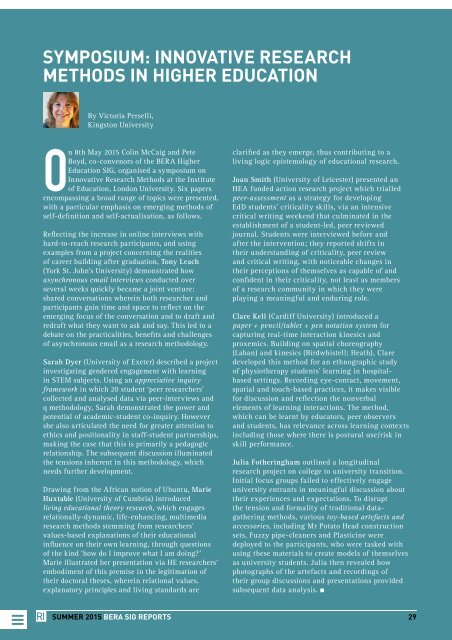CAPACITY
04347-BRA-RI-Magazine-Edition127-Interactive-01-1
04347-BRA-RI-Magazine-Edition127-Interactive-01-1
Create successful ePaper yourself
Turn your PDF publications into a flip-book with our unique Google optimized e-Paper software.
SYMPOSIUM: INNOVATIVE RESEARCH<br />
METHODS IN HIGHER EDUCATION<br />
By Victoria Perselli,<br />
Kingston University<br />
On 8th May 2015 Colin McCaig and Pete<br />
Boyd, co-convenors of the BERA Higher<br />
Education SIG, organised a symposium on<br />
Innovative Research Methods at the Institute<br />
of Education, London University. Six papers<br />
encompassing a broad range of topics were presented,<br />
with a particular emphasis on emerging methods of<br />
self-definition and self-actualisation, as follows.<br />
Reflecting the increase in online interviews with<br />
hard-to-reach research participants, and using<br />
examples from a project concerning the realities<br />
of career building after graduation, Tony Leach<br />
(York St. John’s University) demonstrated how<br />
asynchronous email interviews conducted over<br />
several weeks quickly became a joint venture:<br />
shared conversations wherein both researcher and<br />
participants gain time and space to reflect on the<br />
emerging focus of the conversation and to draft and<br />
redraft what they want to ask and say. This led to a<br />
debate on the practicalities, benefits and challenges<br />
of asynchronous email as a research methodology.<br />
Sarah Dyer (University of Exeter) described a project<br />
investigating gendered engagement with learning<br />
in STEM subjects. Using an appreciative inquiry<br />
framework in which 20 student ‘peer researchers’<br />
collected and analysed data via peer-interviews and<br />
q methodology, Sarah demonstrated the power and<br />
potential of academic-student co-inquiry. However<br />
she also articulated the need for greater attention to<br />
ethics and positionality in staff-student partnerships,<br />
making the case that this is primarily a pedagogic<br />
relationship. The subsequent discussion illuminated<br />
the tensions inherent in this methodology, which<br />
needs further development.<br />
Drawing from the African notion of Ubuntu, Marie<br />
Huxtable (University of Cumbria) introduced<br />
living educational theory research, which engages<br />
relationally-dynamic, life-enhancing, multimedia<br />
research methods stemming from researchers’<br />
values-based explanations of their educational<br />
influence on their own learning, through questions<br />
of the kind ‘how do I improve what I am doing?’<br />
Marie illustrated her presentation via HE researchers’<br />
embodiment of this premise in the legitimation of<br />
their doctoral theses, wherein relational values,<br />
explanatory principles and living standards are<br />
clarified as they emerge, thus contributing to a<br />
living logic epistemology of educational research.<br />
Joan Smith (University of Leicester) presented an<br />
HEA funded action research project which trialled<br />
peer-assessment as a strategy for developing<br />
EdD students’ criticality skills, via an intensive<br />
critical writing weekend that culminated in the<br />
establishment of a student-led, peer reviewed<br />
journal. Students were interviewed before and<br />
after the intervention; they reported shifts in<br />
their understanding of criticality, peer review<br />
and critical writing, with noticeable changes in<br />
their perceptions of themselves as capable of and<br />
confident in their criticality, not least as members<br />
of a research community in which they were<br />
playing a meaningful and enduring role.<br />
Clare Kell (Cardiff University) introduced a<br />
paper + pencil/tablet + pen notation system for<br />
capturing real-time interaction kinesics and<br />
proxemics. Building on spatial choreography<br />
(Laban) and kinesics (Birdwhistell; Heath), Clare<br />
developed this method for an ethnographic study<br />
of physiotherapy students’ learning in hospitalbased<br />
settings. Recording eye-contact, movement,<br />
spatial and touch-based practices, it makes visible<br />
for discussion and reflection the nonverbal<br />
elements of learning interactions. The method,<br />
which can be learnt by educators, peer observers<br />
and students, has relevance across learning contexts<br />
including those where there is postural use/risk in<br />
skill performance.<br />
Julia Fotheringham outlined a longitudinal<br />
research project on college to university transition.<br />
Initial focus groups failed to effectively engage<br />
university entrants in meaningful discussion about<br />
their experiences and expectations. To disrupt<br />
the tension and formality of traditional datagathering<br />
methods, various toy-based artefacts and<br />
accessories, including Mr Potato Head construction<br />
sets, Fuzzy pipe-cleaners and Plasticine were<br />
deployed to the participants, who were tasked with<br />
using these materials to create models of themselves<br />
as university students. Julia then revealed how<br />
photographs of the artefacts and recordings of<br />
their group discussions and presentations provided<br />
subsequent data analysis. n<br />
SUMMER 2015 BERA SIG REPORTS 29


